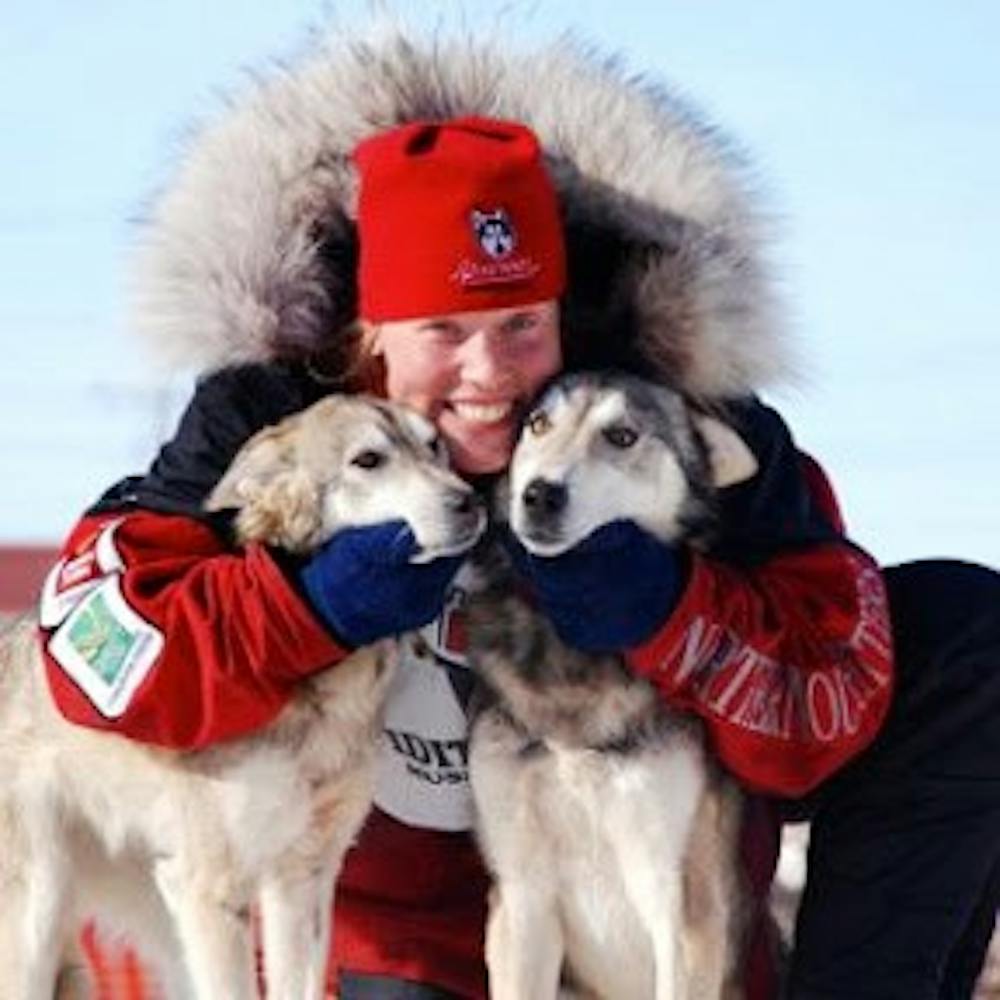
1992 College graduate Aliy Zirkle poses with two of her dogs.
Credit: Aliy Zirkle1992 College graduate Aliy Zirkle will be trekking 1,000 miles through the Arctic wilderness this March with only her 16 sled dogs for company.
A former biological basis of behavior major, Zirkle is now a competitive dog sled racer. She lives in Alaska, operates her own kennel and has placed in the Iditarod’s top two for the past two years.
The Iditarod is one of the best-known dog sledding races in the United States. It begins in Anchorage, Alaska and ends in Nome, Alaska. The race can take almost three weeks to complete.
Zirkle first participated in a dog sled race in a small Native American village, where she came in second to last. In the years since, she has grown as a racer and in 2000, she became the first female winner of the Yukon Quest International Dog Sled Race.
Related: American Indian hip hop artists debut in Ivy conference
Her husband, Allen Moore, is also a dog sled racer and took home the 2013 Yukon Quest title. Moore has also been a competitor in the Iditarod.
Zirkle decided to pursue her current lifestyle after her sophomore year at Penn, when she was looking for a reprieve from “all the people” in urban Philadelphia. She took a flyer advertising summer biology research in Alaska on her way out of a spring-semester biology lab and decided to intern with the U.S. Fish and Wildlife Service. With the permission of her parents, she took off the following fall semester in order to continue the internship.
That summer, she and her team flew over wolf packs to the Arctic, identified the alpha male and female of one pack and tracked their number of pups. They also tracked the pack’s daily activities in correlation with the local moose and caribou.
“That’s how I got to Alaska for good twenty years ago,” Zirkle said.
Upon her return to Penn — where several family members are also graduates — Zirkle worked hard to graduate on time with her classmates in May 1992. She wrote her senior thesis on that summer’s work with the guidance of her biology advisor.
Related: Penn creates new center for network science research
After graduation, she hiked the Appalachian Trail for five months with a friend. The next year, Zirkle accepted a position in Bettles, Alaska, a small village north of the Arctic Circle. The 2010 census reported that the population of Bettles was 12 people.
“When you walk into Wawa [at Penn], the amount of people that are in Wawa is the amount of people that lived in that village,” she said.
With no grocery store or roads in Bettles, Zirkle learned how to live “every woman for herself,” even hunting moose and catching fish for survival. During her second winter in the Arctic, she adopted six Alaskan huskies and dove into the world of dog sled competitions.
Zirkle moved to Two Rivers, Alaska, which is known as a prime training ground for competitive mushers. It was in Two Rivers that she established her kennel, called Skunk’s Place after the first dog that she adopted.
“My husband Allen and I have probably the most successful sled-dog kennel in Alaska,” Zirkle said.
Skunk’s Place is dedicated to giving each dog individualized attention. “I pride myself on knowing what my dogs need and keeping them happy with wagging tails and smiles,” Zirkle added.
Related: A day at the Working Dogs Center
This philosophy has earned her multiple awards for dog care along the competition trails, including the Iditarod’s Humanitarian Award in 2005 and 2011.
Regardless of race outcomes, dog sledding will remain a way of life for Zirkle. “You get on your dog sled and you say ‘Please pull me 1,000 miles’ and a few weeks later you get off your dog sled and you look at your dogs and you say ‘Hey, thanks guys. That was great,’” she said.
The Daily Pennsylvanian is an independent, student-run newspaper. Please consider making a donation to support the coverage that shapes the University. Your generosity ensures a future of strong journalism at Penn.
DonatePlease note All comments are eligible for publication in The Daily Pennsylvanian.





